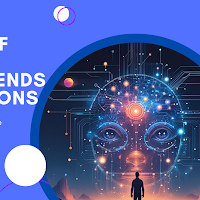As we navigate the rapidly evolving landscape of technology and innovation, machine learning (ML) stands as a pivotal force shaping our future. With its profound ability to derive insights, automate processes, and revolutionize industries, machine learning continues to expand its impact across various domains. This article delves into the emerging trends and future predictions of machine learning, offering a comprehensive overview of what lies ahead.
1. Enhanced Personalization Through AI-Driven Insights
The growing emphasis on personalized experiences is propelling machine learning technologies to new heights. From recommendation systems on streaming platforms to tailored e-commerce experiences, machine learning algorithms are becoming more sophisticated in predicting user preferences.
Key Developments:
- Deep Learning Models: Advanced neural networks enable hyper-personalized interactions by analyzing extensive data sets in real time.
- Natural Language Processing (NLP): Tools like GPT and BERT refine content generation, providing businesses with personalized communication avenues.
- Customer Segmentation: AI-powered insights drive precision marketing, improving customer satisfaction and loyalty.
2. The Rise of Federated Learning for Data Privacy
With increasing concerns over data privacy and stringent regulations like GDPR and CCPA, federated learning is emerging as a game-changing solution. This innovative approach allows machine learning models to train on distributed data without centralizing it, preserving user privacy.
Benefits of Federated Learning:
- Data Security: Sensitive data remains localized, reducing the risk of breaches.
- Collaboration Without Sharing: Organizations can collaborate on model training without compromising proprietary data.
- Applications: Industries like healthcare, finance, and IoT are adopting federated learning to ensure compliance with privacy laws while leveraging AI's potential.
3. AutoML: Simplifying Machine Learning Implementation
Automated Machine Learning (AutoML) is democratizing access to ML by simplifying complex processes. AutoML platforms streamline tasks like data preprocessing, model selection, and hyperparameter tuning, making it easier for non-experts to deploy ML solutions.
Advantages of AutoML:
- Accessibility: Small businesses can now leverage ML without extensive technical expertise.
- Speed: Accelerated deployment cycles enable quicker time-to-market for AI-powered applications.
- Customization: Automated systems offer tailored solutions, catering to unique business needs.
4. Expansion of Edge AI and Real-Time Decision Making
The integration of machine learning at the edge—on devices like smartphones, drones, and IoT sensors—is gaining traction. Edge AI enables real-time data processing without relying on centralized servers, reducing latency and enhancing efficiency.
Notable Applications:
- Autonomous Vehicles: Real-time decision-making systems for navigation and safety.
- Healthcare Devices: Wearables offering instant health insights and anomaly detection.
- Smart Cities: IoT-powered urban solutions for energy efficiency and traffic management.
5. Ethical AI and Bias Mitigation
As machine learning models increasingly influence decisions, ensuring ethical AI practices has become paramount. Bias in AI systems can lead to unfair outcomes, undermining trust in these technologies.
Solutions on the Horizon:
- Explainable AI (XAI): Developing transparent models that clarify decision-making processes.
- Bias Auditing: Frameworks to identify and mitigate biases in datasets and algorithms.
- Regulatory Oversight: Governments and organizations are collaborating to establish ethical standards for AI applications.
6. Quantum Computing’s Role in Machine Learning
Quantum computing is set to revolutionize the field of machine learning by tackling computational challenges that are currently insurmountable with classical systems.
Future Potential:
- Accelerated Training: Quantum processors could exponentially speed up model training times.
- Complex Problem Solving: Optimization tasks, such as supply chain management, could benefit immensely.
- Breakthrough Algorithms: Quantum-enhanced algorithms might unlock new possibilities in areas like cryptography and material science.
7. Industry-Specific Applications of Machine Learning
Machine learning is no longer a one-size-fits-all solution; it is evolving to address specific industry challenges with tailored approaches.
Key Sectors:
- Healthcare: Predictive diagnostics, personalized treatments, and drug discovery.
- Finance: Fraud detection, algorithmic trading, and risk assessment.
- Retail: Inventory management, dynamic pricing, and sentiment analysis.
- Energy: Predictive maintenance of infrastructure and optimization of renewable energy sources.
8. Continued Growth of AI-as-a-Service (AIaaS)
The proliferation of cloud-based machine learning platforms is enabling businesses to integrate ML capabilities without building infrastructure from scratch.
Leading Providers:
- Amazon Web Services (AWS): Offers SageMaker for developing and deploying ML models.
- Google Cloud AI: Provides AutoML and TensorFlow support.
- Microsoft Azure AI: Delivers powerful AI solutions for enterprises.
Benefits:
- Scalability: Seamless scaling of ML solutions based on demand.
- Cost-Efficiency: Pay-as-you-go models reduce upfront investment costs.
- Ease of Use: Pre-built APIs simplify the integration process.
9. The Convergence of ML and IoT
The synergy between machine learning and the Internet of Things (IoT) is driving innovation across sectors. ML algorithms process IoT-generated data to deliver actionable insights and optimize operations.
Use Cases:
- Smart Homes: Personalized automation for energy savings and convenience.
- Predictive Maintenance: Real-time monitoring of equipment to prevent breakdowns.
- Agriculture: Precision farming using sensor data for optimized crop yield.
10. Preparing for a Workforce Transformation
As machine learning automates routine tasks, the workforce must adapt to new roles emphasizing creativity and strategic thinking.
Implications for the Workforce:
- Upskilling: Training programs focused on AI and data analytics.
- Collaboration with AI: Human-machine partnerships to enhance productivity.
- Ethical Oversight: Roles dedicated to ensuring responsible AI deployment.
The future of machine learning is rife with opportunities and challenges, heralding a new era of innovation. From personalized user experiences and ethical AI practices to breakthroughs in quantum computing and edge technologies, machine learning is set to redefine how we interact with the world. Staying ahead in this dynamic landscape requires adaptability, continuous learning, and collaboration across industries.
By embracing these emerging trends, we can harness the transformative power of machine learning to create a smarter, more connected future.


